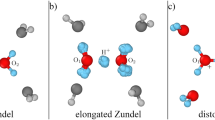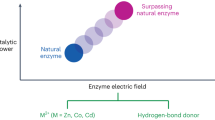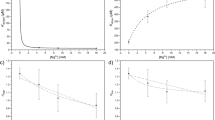Abstract
Substantial negative heat capacity changes (ΔC0p′s) have frequently been observed to accompany the formation of protein–ligand complexes1,2. Glutamate dehydrogenase3 and horse liver alcohol dehydrogenase4, however, have been reported to form binary complexes with coenzyme with negligible ΔH0′ and only small ΔC0p′s. Although many intriguing mechanisms have been proposed to account for the observed phenomena, there is little direct experimental evidence available which might provide a basis for evaluating the contributions of ΔC0p′s of complex formation from the various mechanistic sources or even for distinguishing between them. However, if, as Eftink and Biltonen5 have suggested, a shift in equilibrium between macrostates contributes significantly to an observed ΔC0p′s for a given reaction, it should be possible to characterize such a system by measuring the temperature dependence of the ΔC0p′s. Despite this, few studies have determined ΔH0′ values at more than two temperatures. We have now measured the temperature dependence of the ΔH0′ (and, thereby, that of the ΔC0p′s) of the formation of an enzyme-reduced coenzyme complex in an attempt to provide such a basis and have found that the entire ΔC0p′s of complex formation is accounted for by a temperature-induced shift of an equilibrium between the different forms of the free enzyme.
This is a preview of subscription content, access via your institution
Access options
Subscribe to this journal
Receive 51 print issues and online access
$199.00 per year
only $3.90 per issue
Buy this article
- Purchase on Springer Link
- Instant access to full article PDF
Prices may be subject to local taxes which are calculated during checkout
Similar content being viewed by others
References
Sturtevant, J. M. Proc. natn. Acad. Sci. U.S.A. 74, 2236–2248 (1977).
Biltonen, R. L. & Langerman, M. Meth. Enzym. 61, 287 (1979).
Subramanian, S., Stickel, D. C. & Fisher, H. F. J. biol. Chem. 250, 5885–5889 (1975).
Subramanian, S. Biophys. Chem. 7, 375–378 (1978).
Eftink, M. & Biltonen, R. L. in Biological Microcalorimetry (ed. Beezer, A. E.) 396 (Academic, London, 1980).
Olsen, J. R. & Anfinsen, C. B. J. biol. Chem. 202, 841–856 (1952).
Grisolia, S., Quijada, C. L. & Fernandez, M. Biochim. biophys. Acta 81, 61 (1954).
Colen, A. H., Medary, R. T. & Fisher, H. F. Biopolymers 20, 879–889 (1981).
Catteral, W. A., Hollis, D. P. & Walters, C. F. Biochemistry 8, 4032–4036 (1969).
Author information
Authors and Affiliations
Rights and permissions
About this article
Cite this article
Fisher, H., Colen, A. & Medary, R. Temperature-dependent ΔC0p generated by a shift in equilibrium between macrostates of an enzyme. Nature 292, 271–272 (1981). https://doi.org/10.1038/292271a0
Received:
Accepted:
Published:
Issue Date:
DOI: https://doi.org/10.1038/292271a0
This article is cited by
-
Competing allosteric mechanisms modulate substrate binding in a dimeric enzyme
Nature Structural & Molecular Biology (2011)
Comments
By submitting a comment you agree to abide by our Terms and Community Guidelines. If you find something abusive or that does not comply with our terms or guidelines please flag it as inappropriate.



